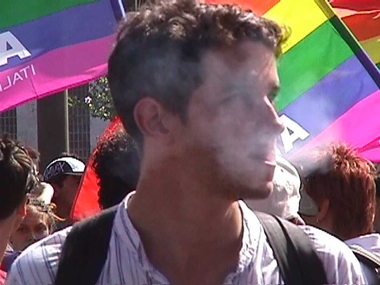You want to quit. You know you do.

Smoking among lesbian, gay, and bisexual individuals in the United States is much higher than among heterosexual/straight individuals. More than one in four lesbian, gay, or bisexual adults smokes cigarettes compared with roughly one in six heterosexual/straight adults.
Smoking increases your risk for lung cancer, heart disease, chronic bronchitis, and other smoking-related diseases.
The statistics are damning, but the stories of the people who make up those statistics are compelling. Often we can see ourselves or others who we love in those stories. Here are three short bios of lesbian, gay, bisexual, and transgender (LGBT) people who are suffering from smoking-related diseases and disabilities.
Brian never imagined he could have a stroke at age 43. He was in good health. But smoking, combined with having HIV, caused a stroke when he was doing what he loved most—working at the potter's wheel. Brian had already beat tough health problems—including being very sick with AIDS—but he had not quit smoking. "It took a stroke for me to actually stop smoking," said Brian. For months after the stroke, Brian had trouble speaking and reading.
Ellie was in her mid-30's when she had her first asthma attack — triggered by exposure to secondhand smoke. She loved her job as a bartender, but began to dread going to work. Ellie says, "I could feel my lungs getting tighter. I knew I couldn't be around the smoke or I was going to die, or something bad was going to happen to me." The severe attacks forced her to leave a job she loved.
Rose started smoking at 13, and before long, she was spending her lunch money on cigarettes instead of food. Her addiction led to lung cancer—and the fight of her life. She never believed it would happen to her. Rose has had surgery twice to fight the disease. At age 60, she died from lung cancer caused by smoking.
If you smoke, you have probably thought about quitting. For support in quitting, including free quit coaching, a free quit plan, free educational materials, and referrals to local resources, call (800) QUIT-NOW [(800) 784-8669].





